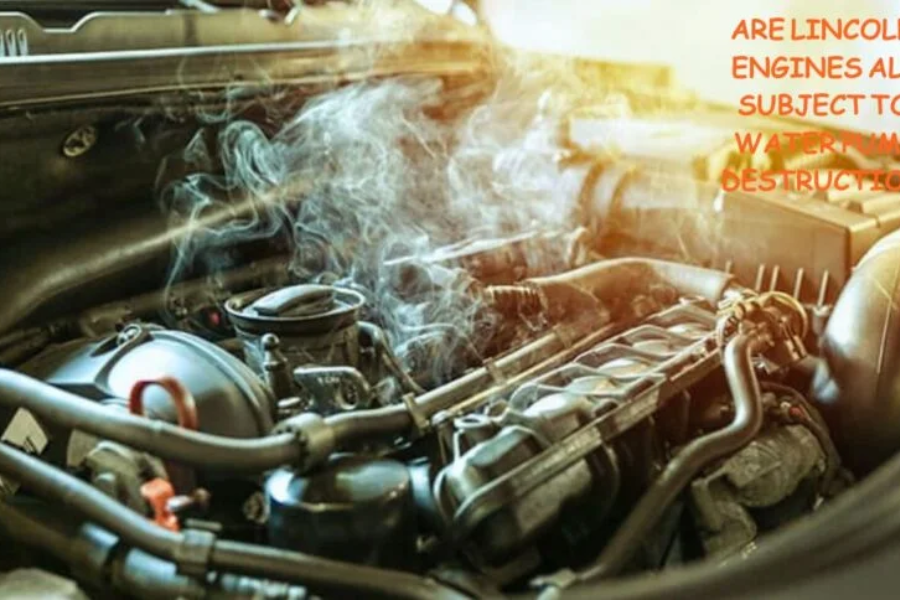Are Lincoln Engines All Subject to Water Pump Destruction? Exploring the Facts
Introduction
Lincoln engines, especially those featuring certain V6 and V8 configurations, have faced issues with water pump failures. However, this problem does not affect all Lincoln engines. The issue predominantly occurs in engines where the water pump is driven by the timing chain—a design seen in several Ford and Lincoln models. This includes engines like the 3.5L and 3.7L V6, such as the Ford Duratec 35 and Cyclone engines. These engines are used across a range of Ford, Lincoln, and Mercury vehicles.
Understanding the Water Pump’s Role in a Lincoln Engine
Understanding the function of the water pump in a Lincoln engine is essential before we get into specific issues. An essential component of the engine’s cooling system is the water pump. Its main job is to move coolant through the engine block, radiator, and hoses to keep the engine at the right temperature to run. The water pump helps keep the engine cool, preventing overheating, which could damage the engine badly.
Why Is the Water Pump So Important?
The water pump is very important in keeping the engine at the right temperature. Parts can expand, warp, or even fail completely if the engine overheats. Overheating can lead to serious issues like cracked engine blocks, blown head gaskets, and other significant damage. Consequently, the water pump is necessary for any vehicle’s performance and longevity, including Lincoln models.
The Significance of High-Quality Replacement Parts
Choosing high-quality alternative parts for your water pump is crucial. While cheaper, lower-quality components may save you money upfront, they can lead to more frequent failures and higher long-term costs. Investing in reliable parts ensures the durability and optimal performance of your Lincoln engine.
Water Pump Issues in Lincoln Engines
A major issue with Lincoln engines, particularly those with EcoBoost V6 engines, is the risk of water pump failure. Unlike traditional external water pumps, some Lincoln engines feature an internal water pump design. This setup integrates the pump directly into the engine block, potentially causing significant complications if it fails.
Internal Water Pump Design: A Double-Edged Sword
The internal water pump design offers advantages such as reduced noise and a more compact engine layout. However, it also has a significant drawback: if the pump fails, coolant can leak into the engine’s oil system. If not addressed promptly, this contamination can lead to severe engine damage.
Signs of Water Pump Failure
Lincoln car owners should be vigilant for signs of a failing water pump, which may include:
- Coolant Leaks: If you notice coolant pooling under your vehicle or a drop in coolant levels, it could indicate a problem with the water pump.
- Overheating: If the engine temperature consistently runs higher than normal, it might be due to a failing water pump.
- Unusual Noises: A malfunctioning water pump can produce whining or grinding sounds, especially from the front of the engine.
- Oil Contamination: If coolant mixes with the oil, you might see a milky or foamy appearance on the oil dipstick.
Recognizing these symptoms early can help prevent more severe damage to your engine.
The Risk of Engine Damage
If the water pump in a Lincoln engine fails and coolant contaminates the engine oil, it can lead to significant damage. Contaminated oil fails to lubricate properly, increasing friction and wear on engine components. Over time, this can cause severe engine issues, potentially requiring expensive repairs or even a full engine replacement.
Water Pump Issues in Lincoln Engines
A key concern with Lincoln engines, especially the EcoBoost V6 models, is the risk of water pump failure. Unlike conventional external water pumps, some Lincoln engines feature an internal design that embeds the pump within the engine block. This setup can lead to major issues if the pump fails, complicating repairs and maintenance.
Internal Water Pump Design: A Double-Edged Sword
The internal water pump design offers benefits like reduced noise and a more streamlined engine layout. However, it has a notable downside: if the water pump fails, coolant can leak into the engine’s oil system. This contamination can cause severe engine damage if not promptly addressed.
Signs of Water Pump Failure
Lincoln vehicle owners should be alert to signs of a failing water pump, which may include:
- Coolant Leaks: Pooling coolant under your vehicle or a noticeable drop in coolant levels could signal a problem with the water pump.
- Overheating: Consistently high readings on your engine temperature gauge might indicate a failing water pump.
- Unusual Noises: A malfunctioning water pump can create whining or grinding sounds, often coming from the front of the engine.
- Oil Contamination: If coolant mixes with the oil, you may see a milky or frothy appearance on the oil dipstick.
Recognizing these symptoms early can help prevent further engine damage.
The Risk of Engine Damage
If a Lincoln engine’s water pump fails and coolant contaminates the engine oil, it could cause significant damage. Lubrication is reduced by contaminated oil, which increases friction and wear on engine components. This can lead to engine seizing over time, necessitating costly repairs or even a complete engine replacement.
Case Studies: Lincoln Water Pump Experiences
To better understand the potential risks, let’s examine a few case studies involving Lincoln owners who faced water pump issues:
Case Study 1: Lincoln MKX 3.5L EcoBoost V6
An owner of a Lincoln MKX with the 3.5L EcoBoost V6 engine reported unexpected overheating. A visit to the mechanic revealed that the internal water pump had failed, causing coolant to leak into the oil system. Fortunately, the issue was detected early, allowing for a water pump replacement before significant engine damage occurred.
Case Study 2: Lincoln Navigator 3.5L EcoBoost V6
A Lincoln Navigator owner experienced similar problems, including overheating and coolant loss. Unfortunately, the issue went unnoticed until the engine suffered extensive damage from oil contamination. The repair costs were substantial, leading the owner to replace the entire engine.
Case Study 3: Lincoln Continental 2.7L EcoBoost V6
A Lincoln Continental owner with a 2.7L EcoBoost V6 noticed a minor coolant leak and a whining noise from the engine. A quick diagnostic confirmed an impending water pump failure. The owner chose to replace the water pump proactively, preventing further complications.
These case studies illustrate the importance of addressing water pump issues promptly to avoid costly repairs and potential engine damage.
Are All Lincoln Engines at Risk?
Lincoln Engines All Subject to Water Pump Destruction
While water pump issues can occur in Lincoln engines, they are not inevitable. The likelihood of encountering such problems depends on several factors, including maintenance practices, driving habits, and the specific engine model.
EcoBoost V6 Engines: Higher Risk
Lincoln vehicles equipped with the 3.5L and 2.7L EcoBoost V6 engines may face a higher risk of water pump problems due to their internal water pump design. However, this doesn’t guarantee failure—many owners drive their Lincolns for years without experiencing any issues.
Other Lincoln Engines: Lower Risk
Models with different engines, such as the 5.0L V8 or the 2.0L turbocharged inline-four, are less likely to have water pump problems. These engines typically use external water pumps, which are easier to access and replace.
Weighing the Risks and Benefits
When considering a Lincoln vehicle, it’s important to balance potential risks with the benefits. Lincoln offers high-performance, luxury vehicles that many owners enjoy without significant problems. However, if you’re purchasing a used Lincoln with high mileage, it’s wise to have the water pump inspected and consider a preventive replacement if needed.
Conclusion
In summary, while Lincoln engines are not universally prone to water pump failures, certain models—particularly those equipped with the 3.5L and 2.7L EcoBoost V6 engines—do present a higher risk due to their internal water pump design. Understanding the critical role of the water pump in maintaining engine temperature and preventing overheating is essential for all vehicle owners. Early detection of issues such as coolant leaks, overheating, unusual noises, and oil contamination can help mitigate the risk of severe engine damage and costly repairs. Regular maintenance and high-quality replacement parts are crucial for ensuring the longevity and performance of Lincoln engines. By staying vigilant and proactive, Lincoln owners can enjoy the reliability and luxury of their vehicles without unnecessary concerns about water pump problems.
FAQs
1. Are all Lincoln engines prone to water pump failures?
No, not all Lincoln engines are susceptible to water pump failures. The risk is notably higher in engines with internal water pump designs, such as the 3.5L and 2.7L EcoBoost V6. Other engines, especially those with external water pumps, have a lower risk of such issues.
2. What are the common signs of a failing water pump in a Lincoln vehicle?
Common signs of a failing water pump include coolant leaks, engine overheating, unusual noises (such as whining or grinding), and oil contamination (which may appear as a milky or frothy substance on the oil dipstick).
3. How can I prevent water pump issues in my Lincoln vehicle?
Preventive measures include regular maintenance checks, timely replacement of the water pump with high-quality parts, and monitoring for early signs of problems. It’s also beneficial to follow the manufacturer’s recommended service intervals and address any issues promptly.
4. What should I do if I suspect a water pump failure in my Lincoln?
If you suspect a water pump failure, it’s important to have your vehicle inspected by a professional mechanic as soon as possible. Early diagnosis and repair can prevent severe engine damage and reduce repair costs.
5. Are there specific Lincoln models that are more likely to experience water pump problems?
Yes, Lincoln models with the 3.5L and 2.7L EcoBoost V6 engines are more likely to experience water pump issues due to their internal design. However, other Lincoln models with external water pumps are generally at a lower risk.
6. Can water pump failure cause significant engine damage?
Yes, if the water pump fails and coolant contaminates the engine oil, it can lead to significant engine damage. Contaminated oil reduces lubrication, which can cause increased friction, wear, and potentially result in engine seizing or requiring a full replacement.
7. How can I ensure the longevity of my Lincoln engine’s water pump?
Ensuring the longevity of your Lincoln engine’s water pump involves regular maintenance, using high-quality replacement parts, and being proactive in addressing any early symptoms of failure. Regular inspections and following maintenance recommendations from your vehicle’s manufacturer are also key.
Stay informed with the news and updates on Gaze Up






